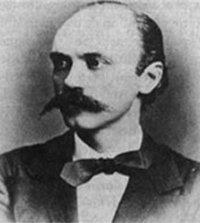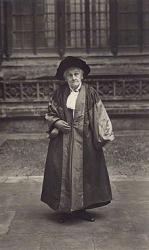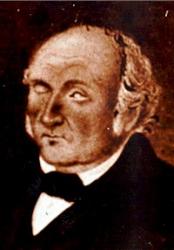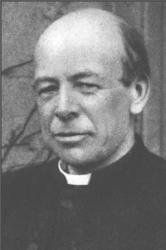Planning worship?
Check out our sister site, ZeteoSearch.org,
for 20+ additional resources related to your search.
- |
User Links
Person Results
Joseph Barnby

1838 - 1896 Person Name: Joseph Barnby, 1838-1896 Topics: The Nation and Commonweal Composer of "ST. CHRYSOSTOM" in The Book of Praise Joseph Barnby (b. York, England, 1838; d. London, England, 1896) An accomplished and popular choral director in England, Barnby showed his musical genius early: he was an organist and choirmaster at the age of twelve. He became organist at St. Andrews, Wells Street, London, where he developed an outstanding choral program (at times nicknamed "the Sunday Opera"). Barnby introduced annual performances of J. S. Bach's St. John Passion in St. Anne's, Soho, and directed the first performance in an English church of the St. Matthew Passion. He was also active in regional music festivals, conducted the Royal Choral Society, and composed and edited music (mainly for Novello and Company). In 1892 he was knighted by Queen Victoria. His compositions include many anthems and service music for the Anglican liturgy, as well as 246 hymn tunes (published posthumously in 1897). He edited four hymnals, including The Hymnary (1872) and The Congregational Sunday School Hymnal (1891), and coedited The Cathedral Psalter (1873).
Bert Polman
Joseph Barnby
H. W. Baker

1821 - 1877 Person Name: Henry Williams Baker, 1821-1877 Topics: The Nation and Commonweal Author of "O God of love, O King of peace" in The Book of Praise Baker, Sir Henry Williams, Bart., eldest son of Admiral Sir Henry Loraine Baker, born in London, May 27, 1821, and educated at Trinity College, Cambridge, where he graduated, B.A. 1844, M.A. 1847. Taking Holy Orders in 1844, he became, in 1851, Vicar of Monkland, Herefordshire. This benefice he held to his death, on Monday, Feb. 12, 1877. He succeeded to the Baronetcy in 1851. Sir Henry's name is intimately associated with hymnody. One of his earliest compositions was the very beautiful hymn, "Oh! what if we are Christ's," which he contributed to Murray's Hymnal for the Use of the English Church, 1852. His hymns, including metrical litanies and translations, number in the revised edition of Hymns Ancient & Modern, 33 in all. These were contributed at various times to Murray's Hymnal, Hymns Ancient & Modern and the London Mission Hymn Book, 1876-7. The last contains his three latest hymns. These are not included in Hymns Ancient & Modern. Of his hymns four only are in the highest strains of jubilation, another four are bright and cheerful, and the remainder are very tender, but exceedingly plaintive, sometimes even to sadness. Even those which at first seem bright and cheerful have an undertone of plaintiveness, and leave a dreamy sadness upon the spirit of the singer. Poetical figures, far-fetched illustrations, and difficult compound words, he entirely eschewed. In his simplicity of language, smoothness of rhythm, and earnestness of utterance, he reminds one forcibly of the saintly Lyte. In common with Lyte also, if a subject presented itself to his mind with striking contrasts of lights and shadows, he almost invariably sought shelter in the shadows. The last audible words which lingered on his dying lips were the third stanza of his exquisite rendering of the 23rd Psalm, "The King of Love, my Shepherd is:"—
Perverse and foolish, oft I strayed,
But yet in love He sought me,
And on His Shoulder gently laid,
And home, rejoicing, brought me."
This tender sadness, brightened by a soft calm peace, was an epitome of his poetical life.
Sir Henry's labours as the Editor of Hymns Ancient & Modern were very arduous. The trial copy was distributed amongst a few friends in 1859; first ed. published 1861, and the Appendix, in 1868; the trial copy of the revised ed. was issued in 1874, and the publication followed in 1875. In addition he edited Hymns for the London Mission, 1874, and Hymns for Mission Services, n.d., c. 1876-7. He also published Daily Prayers for those who work hard; a Daily Text Book, &c. In Hymns Ancient & Modern there are also four tunes (33, 211, 254, 472) the melodies of which are by Sir Henry, and the harmonies by Dr. Monk. He died Feb. 12, 1877.
--John Julian, Dictionary of Hymnology (1907)
H. W. Baker
Aleksēi Federovich L'vov

1798 - 1870 Person Name: Aleksyei Theodorovich Lwoff, 1799-1870 Topics: The Nation and Commonweal Composer of "RUSSIAN HYMN" in The Book of Praise Alexis Federovich L’vov Estonia 1798-1870. Born at Reval, Estonia, son of the St. Petersburg imperial court chapel director, he learned violin as a child and gave regular concerts in his home at age 9. Studying under a number of teachers until age 19, he then studied independently and developed his own personal style of playing. He entered the Russian army in 1818, became a civil engineer there eventually a General in 1828, when he was appointed Aide-de-camp to Tsar Nicholas I. He married Praskovya Aggeyevna, and they had a son and two daughters. He eventually took over his father’s post after he died in 1837 and stayed at that position for 24 years. He formed a string quartet in St. Petersburg and held weekly concerts at his private residence, which were attended by members of high society, including Franz Liszt, Robert and Clara Schumann, and Berlioz. In charge of the Russian chapel choir, it was described by Berlioz as of exceptional quality, expressing regret that Europeans were unable to hear the extraordinary sounds of the chapel choir (80 singers). L’vov took his quartet on several European tours where he could play to public audiences. He met Mendelssohn, Meyerbeer, and Spontini, who became personal friends. L’vov codified the Russian liturgical musical style ‘Obikhod’, the standard repertory of most Russian Orthodox churches in the world. L’vov was a member of the Russian musical establishment. Two of his friends who attained musical fame were Glinka and Berlioz, both impressed with L’vov’s superb violin playing and composing abilities. He composed violin music, operas and various religious pieces. His opera “Undine” (1846) became famous. In 1850 he founded the Russian Concert Society. His musical style was eclectic, combining traditions of Russian culture with Italian and German influences. He retired in 1867 due to deafness. He died near Kovno, Lithuania.
John Perry
Aleksēi Federovich L'vov
Thomas Norris
1741 - 1790 Person Name: Thomas Norris, 1741-1790 Topics: The Nation and Commonweal Composer of "CHANT (NORRIS)" in The Book of Praise
Thomas Norris
Calixa Lavallée

1842 - 1891 Person Name: Calixa Lavallee, 1842-1891 Topics: The Nation and Commonweal Composer of "O CANADA" in The Book of Praise Born: December 28, 1842, Verchères, Canada.
Died: January 21, 1891, Boston, Massachusetts.
Buried: Boston, Massachusetts; reinterred in 1933 in Notre-Dame-des-Neiges Cemetery, Montréal, Canada.
Lavallée’s father was originally a wood cutter and blacksmith, but eventually started repairing musical instruments and teaching music in his local community. After moving to St. Hyacinthe, Calixa’s father worked for organ builder Joseph Casavant. Calixa was playing the organ by age 11, and at age 13 gave a piano recital in the Théâtre Royal in Montréal. Calixa later moved to America, where he a won a competition in New Orleans, Louisiana. As accompanist to Spanish violinist Olivera, he toured Brazil and the West Indies, then returned to America and fought in the American civil war, rising to rank of lieutenant on the northern side. He returned to Montréal after the war, but continued to do concert tours and teach. The Congrès National des Canadiens-Français commissioned him to compose "O Canada" for St. Jean-Baptiste Day in 1880. In 1887, he became president of the Music Teachers’ National Association. Lavallée wrote operettas, a symphony, and various occasional pieces and songs.
Sources:
Jones, pp. 84-85
--www.hymntime.com/tch/
See also in:
Wikipedia
Calixa Lavallée
Dame Elizabeth Wordsworth

1840 - 1932 Person Name: Elizabeth Wordsworth, 1840- Topics: The Nation and Commonweal Author of "O Lord our Banner, God of might" in The Book of Praise Wordsworth, Elizabeth, daughter of Bp. C. Wordsworth, of Lincoln, was b. at Harrow in 1840, and is now (1907) the Head of the Lady Margaret Hall, Oxford. The following of her hymns are in common use:—
1. God is our Stronghold and our Stay. [Ps. xlvi.] This is a metrical rendering of the Book of Common Prayer version of the forty-sixth Psalm in the Metre of "Ein' feste Burg." It was written for and first published in Church Hymns, 1903. Miss Wordsworth's translation direct from the German of "Ein' feste Burg," is given under that hymn.
2. Great Ruler of the Nations. [For Peace.] Written during the South African war, and included in Church Hymns, 1903.
3. O Lord our Banner, God of Might. [In Time of War.] Miss Wordsworth wrote concerning this hymn: "To the best of my knowledge and belief, I wrote it in the winter of 1884-5, when the excitement about General Gordon was at its height. . The lines ‘Jehovah-Nissi' appeared in the Guardian of Jan. 21, 1885, feigned ‘Veritas.' This is our family motto, and as such was well known to my own famiiy circle" (Church Times, Nov. 17, 1899). The hymn was frequently printed as a leaflet, and entitled "Jehovah-Nissi. A hymn for our Soldiers." It was included in Church Hymns, 1903.
--John Julian, Dictionary of Hymnology, New Supplement (1907)
Dame Elizabeth Wordsworth
Frank Mason North

1850 - 1935 Person Name: Frank Mason North, 1850- Topics: The Nation and Commonweal Author of "Where cross the crowded ways of life" in The Book of Praise North, Frank Mason, D.D., b. at New York, Dec. 3, 1850, graduated at Wesleyan University 1872, and entered the ministry of the Methodist Episcopal Church 1872. In 1892 he became Correspondence Secretary of the New York City Church Extension and Missionary Society, and is now (1905) editor of The Christian City. His hymns in common use include:—
1. Jesus, the calm that fills my breast. [Peace.] In The Plymouth Hymnal,1894; Sursum Corda, 1898; The Methodist Hymnal, 1905, &c.
2. When cross the crowded ways of life. [City Missions.] In The Methodist Hymnal, 1905. [Rev. L. F. Benson, D.D.]
--John Julian, Dictionary of Hymnology, New Supplement (1907)
=================
North, Frank Mason, D.D. (December 3, 1850--December 17, 1935). The Appendix Index reference, p.1607 in Julian, to Dr. North is to John Post Attwater who used "Frank North" as his nom de plume. In addition to the information included in the short biographical sketch at p.1677 it should be added that Dr. North continued his studies at Wesleyan University, advancing to the M.A. degree in 1875, later being honored by that institution's D.D., 1894, and L.L.D., 1918. He was a member of the New York East Conference of the Methodist Episcopal Church and served several pastorates in New York State and City as well as one at Middletown, Connecticut, 1887-1892. During the years 1892-1912, while Corresponding Secretary of the New York City Extension and Missionary Society and the editor of The Christian City, he was also Corresponding Secretary of the National City Evangelical Union of the Methodist Episcopal Church. From 1912 to 1924 he was the Secretary of the Board of Foreign Missions of his church and through these years he served as Chairman of its Executive Committee. He was also Secretary, Chairman of the Executive Committee, and President of the Federal Council of the Churches of Christ in America. It was largely through his efforts and influence that the Federal Council was organized.
Trustee and member of governing boards of numerous institutions in the United States, China, and Japan, among the additional honors which came to him were Chevalier Legion of Honor and "Officer de l'Instruction Publique," France; Officer of the Royal Order of George I, Greece. He was one of the great Protestant leaders of his generation. The leading article in The Hymn, 30 April 1950, was an excellent appreciation of Dr. North and his work.
Sources: Handbooks of various hymnals; Who Was Who I; Foote, Henry Wilder, Three Centuries of American Hymnody; Ninde, Edward S., Story of the American Hymn; Bailey, ALbert E., The Gospel in Hymns; Pratt, John Barnes, Present Day Hymns; correspondence.
--Robert G. McCutchan, DNAH Archives
Frank Mason North
Rudyard Kipling

1865 - 1936 Person Name: Rudyard Kipling, 1865- Topics: The Nation and Commonweal Author of "God of our fathers, known of old" in The Book of Praise Born: December 30, 1865, Bombay (now Mumbai), India.
Died: January 18, 1936, London, England.
Buried: Westminster Abbey, London, England.
Kipling, Rudyard, the well-known poet and story-teller, was born at Bombay, India, Dec. 30, 1865, and now (1906) lives at Burwash in Sussex. His noble poem, "The Recessional," was written in 1897 at the time of the Diamond Jubilee of Queen Victoria, contributed to the Times for July 17, 1897, and first published by the author in his The Five Nations, 1903, p. 214, beginning "God of our fathers, known of old" (National). It has passed into Sursum Corda, Phil., 1898, The English Hymnal, 1906. [Rev. James Mearns, M.A.]
--John Julian, Dictionary of Hymnology, New Supplement (1907)
Rudyard Kipling
Neil Dougall

1776 - 1862 Person Name: Neil Dougall, 1776-1862 Topics: The Nation and Commonweal Composer of "KILMARNOCK" in The Book of Praise Born: December 9, 1776, Greenock, Renfrewshire, Scotland.
Died: October 1, 1862, Greenock, Scotland.
Buried: Greenock, Scotland.
Neil’s father, wheelwright Neill Dougall, was drafted into the army, and died in Ceylon (now Sri Lanka) when his son was only four years old. At age 15, Neil became an apprentice on the ship Britannia. In 1795, while he was loading a gun to fire the second volley of a salute to commemorate Lord Howe’s victory over the French, an explosion blinded him and took his arm. After recovering, he began his musical career. In 1798, he attended a singing class under Robert Duncan, and in the fall of the next year opened his own class, which he ran until 1844. He gave annual concerts in Greenock from 1800 [sic, Frost] to 1860.
--www.hymntime.com/tch
Neil Dougall
Henry Scott Holland

1847 - 1918 Person Name: Henry Scott Holland, 1847-1918 Topics: The Nation and Commonweal Author of "Judge Eternal, throned in splendour" in The Book of Praise Holland, Henry Scott, D.D., son of G. H. Holland of Gayton Lodge, Wimbledon Common, was born Jan. 27, 1847, at Ledbury, Hereford, and educated at Eton and at Balliol Coll., Oxford (B.A. 1870, M.A. 1873, D.D. Aberdeen 1903). He became Senior Student of Christ Church, Oxford, in 1870, was ordained D. 1872, P. 1874, and has been Canon of St. Paul's, London, since 1884. His hymn, "Judge eternal, throned in splendour" (Prayer for the Nation), appeared in the Commonwealth for July 1902, and is in The English Hymnal, 1906, No. 423. [Rev. James Mearns, M.A.]
--John Julian, Dictionary of Hymnology, New Supplement (1907)
Henry Scott Holland


 My Starred Hymns
My Starred Hymns

